Renting a car in Portugal offers unparalleled freedom to explore everything from beautiful wind-swept beaches to historic old towns at your own pace. While renting a car in Europe can be challenging, navigating the rental process in Portugal can be as tricky as the winding streets of Lisbon. From hidden charges to insurance to security deposits, here’s a guide with 12 practical tips to make renting a car in Portugal as easy as possible.
This post may contain affiliate links. If you make a purchase through these links, we will earn a small commission at no additional cost to you. We recommend products we have personally used or verified. Read the full disclosure here.
We use and recommend Discovercars.com, which is a rental car aggregator site. It allows users to easily search pricing and availability across a variety of rental car companies. A few of the features that we enjoy are transparent pricing (avoiding hidden fees and surprises) and easy options for full insurance coverage.
If you don’t have time to read this now, pin it for later!

Renting a Car in Portugal Highlights
- Do You Need to Rent a Car in Portugal?
- Choose a Smaller Car
- Manual vs. Automatic Transmission
- Understand Security Deposits
- Accepted Payment Methods
- Insurance Requirements
- Fuel Type: Diesel, Gas, or Electric?
- Additional Fees and Considerations
- Via Verde Passes
- Regional Requirements: Snow Chains
- Parking Rules
- Cross-Border Travel and Ferries
1. Do You Need to Rent a Car in Portugal?
Deciding whether you need to rent a car in Portugal depends largely on the nature of your visit and your itinerary. Here are some criteria we recommend using when deciding on renting a car or not:
- If you’re planning to explore major cities like Lisbon or Porto, you might find that public transportation options—such as trams, buses, and metro systems—are more convenient given the challenge of navigating narrow streets and finding parking.
- If you are planning to explore the picturesque countryside on a Lisbon to Coimbra Road Trip, visiting multiple regions, or if you’re keen on having the flexibility to discover hidden gems and secluded beaches at your own pace, renting a car becomes invaluable.
- If staying primarily in major cities, but you’d like to take occasional outings into the countryside, consider whether you can join a tour or take public transport. Alternatively, renting a car for the day could be a good solution.
One solution that we’ve found works well for us is to stay just outside of Lisbon and Porto. For example, we stay in Cascais when visiting Lisbon and in Matosinhos or Foz do Douro when visiting Porto. We rent an apartment with parking, so that we can easily explore the countryside. When we want to explore the cities, we are just a 30-40 minute metro ride away.
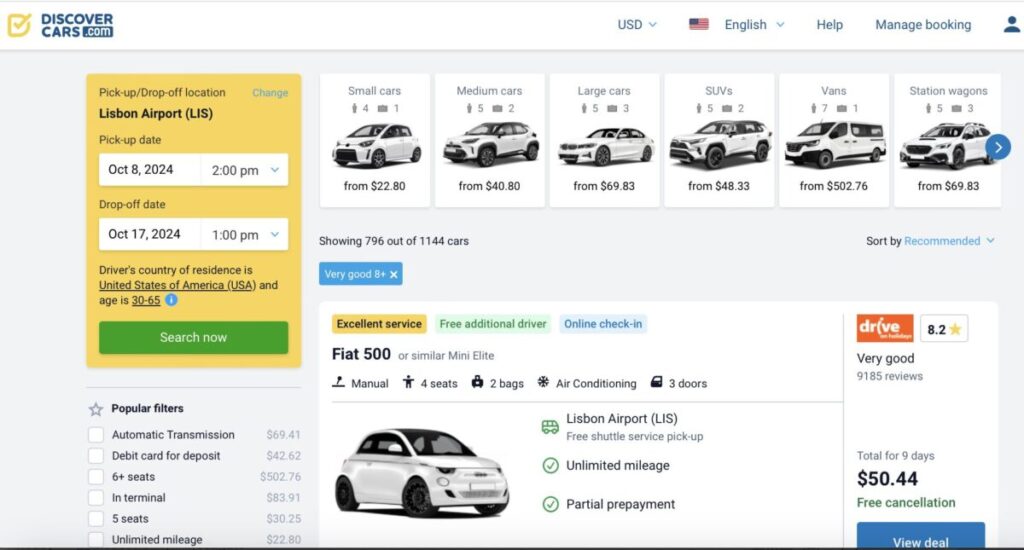
2. Choose a Smaller Car
Portugal’s old towns are charming mazes of narrow, cobblestone streets. These can be incredibly hard to navigate in larger cars and campers. Parking spots can be hard to come by in the older areas of Lisbon and Porto, as well as in smaller towns. People get quite creative with finding and making parking spots, making parking a large car very challenging.
We’ve rented a number of apartments, which have had underground parking included. The spiral ramps into the garages, as well as the assigned spots, have been incredibly narrow. For all of these reasons, consider opting for the smallest car that will fit your group and luggage).
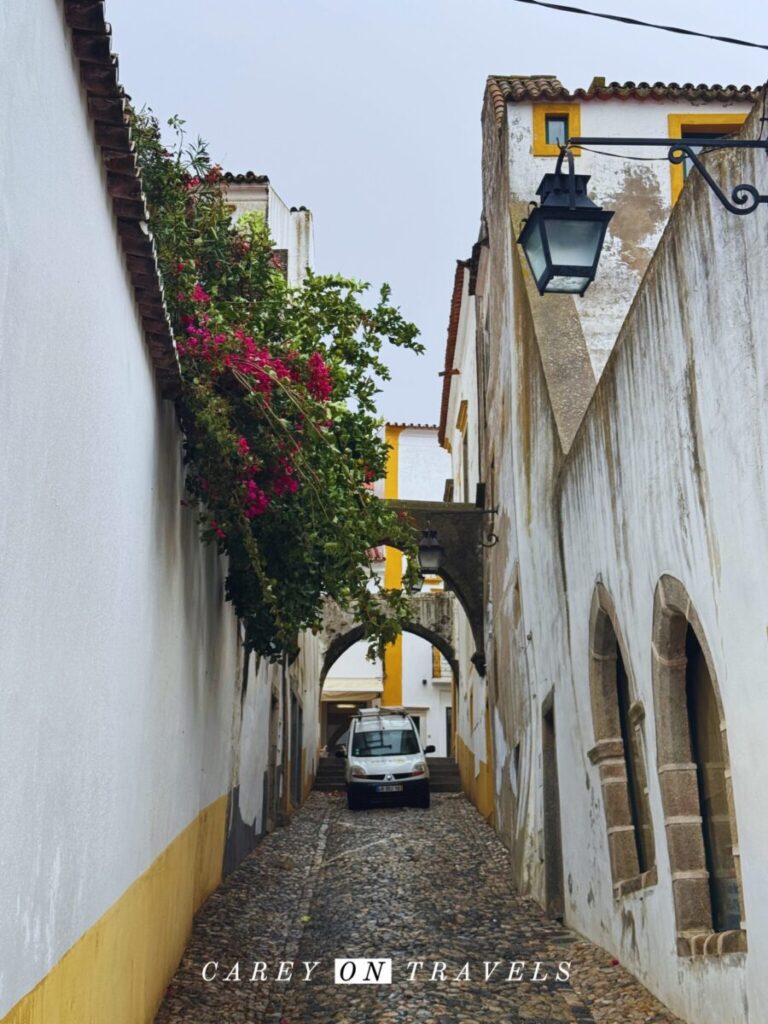
3. Manual vs. Automatic Transmission
When renting a car in Portugal, it’s important to consider that most rental cars come with manual transmission. While automatic cars are typically available, they usually come at a higher cost. If you’d prefer an automatic transmission, be sure to reserve this up front. Don’t assume that there will be an automatic car available if you have not reserved it.
Should you rent a car with manual transmission if you are not confident in driving a manual car? Make your decision based on your comfort level with driving a manual car in hilly terrain. While there are some flat areas, much of Portugal is hilly. Don’t underestimate the challenge of this if you are not a confident driver.
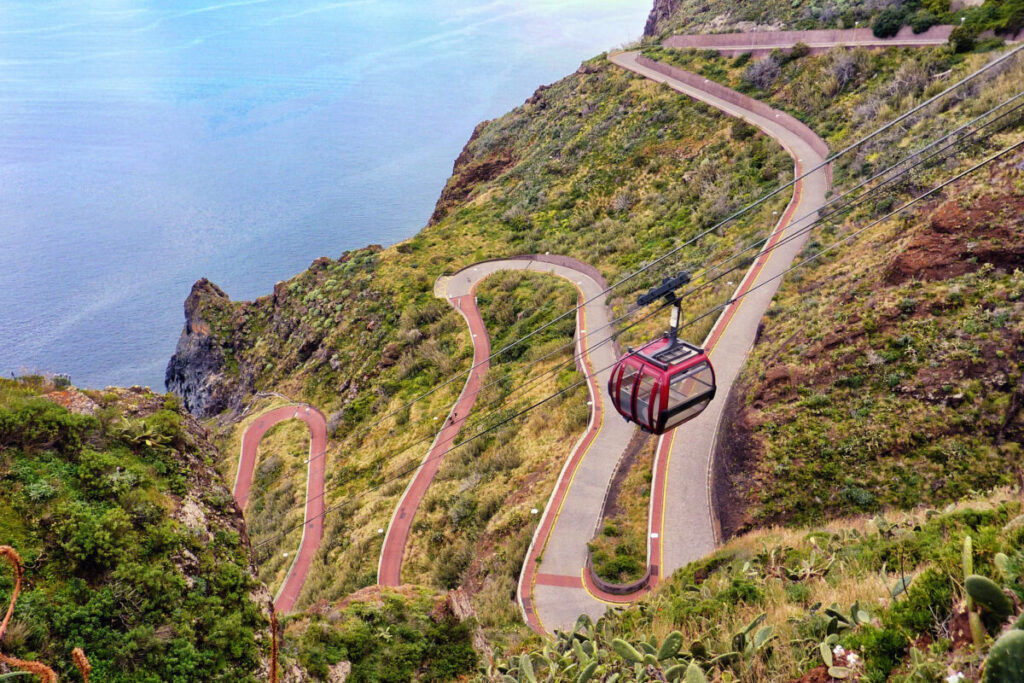
4. Understand Security Deposits
Rental companies in Portugal usually require a security deposit in case of damages to the rental car. The amount is typically charged at car pickup, and is fully refundable if there are no damages or violations during your rental period. A few important considerations:
- Always check the rental conditions (see example below from Discovercars.com) to see what the security deposit charges are.
- In Portugal, we’ve seen anything from 200 – 1600 EUR security deposits during our searches. In many cases, the most inexpensive car rentals come with the highest security deposits, and the more expensive rentals come with the lowest security deposits.
- Ensure that you have sufficient free credit on your credit card before picking up your rental car (to cover not just the rental but also the security deposit fees).
- IMPORTANT: as you’ll see in the screenshot below, it is very standard that the deposit block on the customer’s credit card will not be released until 30 days after car drop-off.
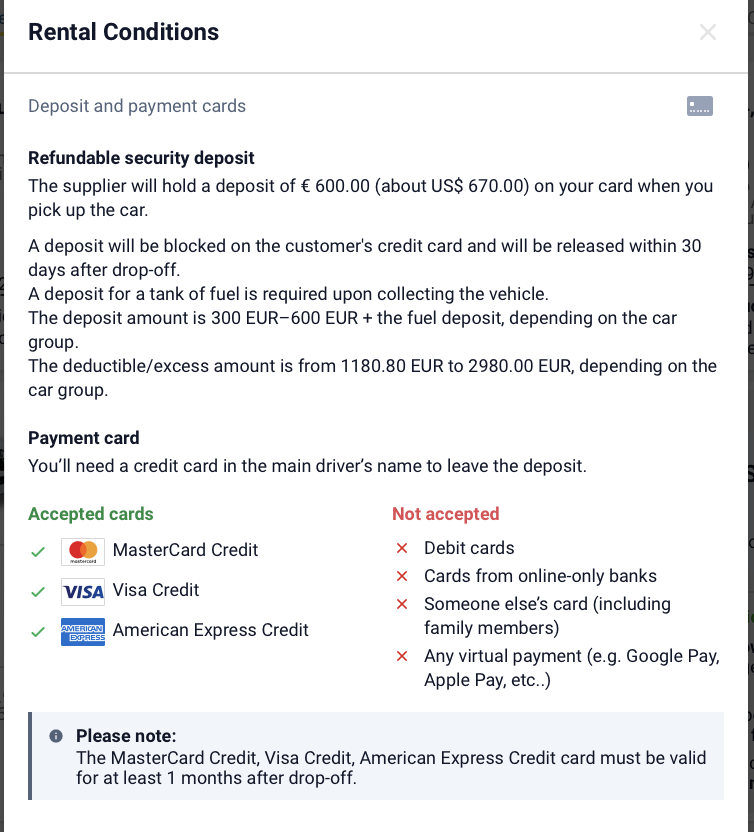
5. Accepted Payment Methods
Most Portuguese car rental companies prefer credit cards over debit cards. American Express and certain other card types might not be widely accepted, so it’s advisable to have a Visa or MasterCard. We’ve frequently also seen requirements such as no online credit cards, ApplePay, and GooglePay.
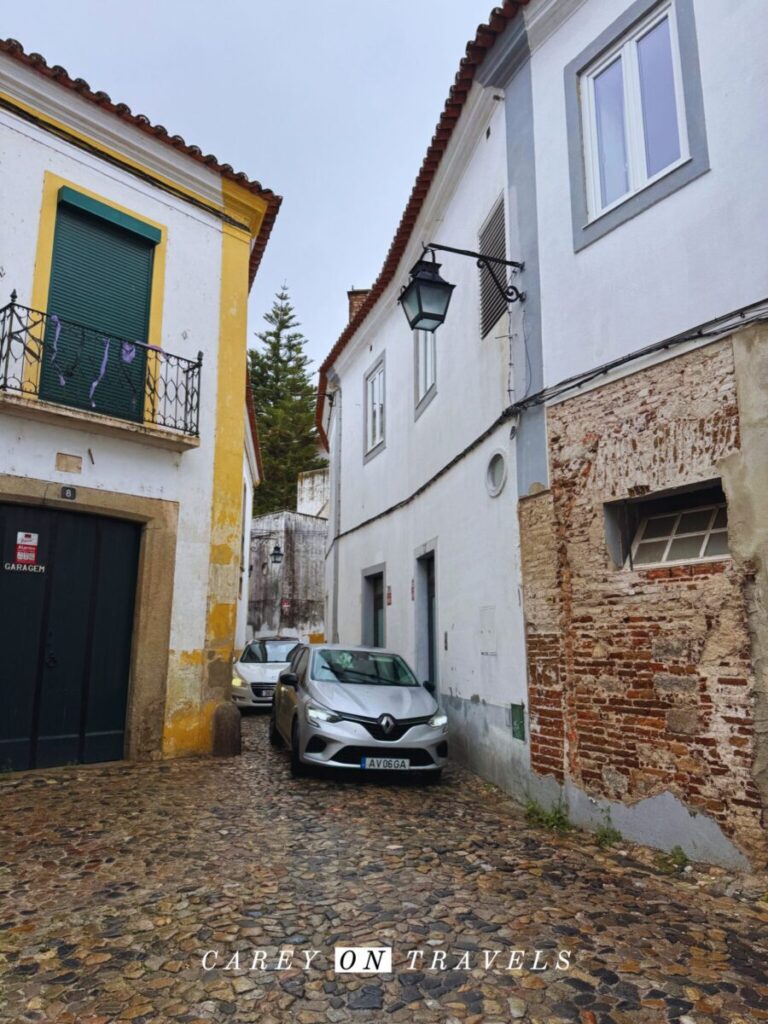
6. Insurance Requirements
Insurance is a critical component of renting a car. While basic insurance is typically included in rental prices, it often comes with a high deductible. If you spend time exploring Portugal’s large cities, such as Lisbon and Porto, you’ll notice that many cars have dings and scrapes from minor fender benders. For this reason (and the risk of a major accident occurring), consider purchasing additional coverage for peace of mind, especially to cover theft or damage to the car.
A few points to consider:
- In Portugal, all drivers are required by law to carry unlimited third-party liability insurance coverage. 3rd party liability is therefore typically included in the price of the rental car (do confirm this each time).
- Collision damage waiver and Theft protection are frequently included, though the customer is responsible for costs up to the deductible. In the example in the screenshot below, the customer would be responsible for up to $5700 in damages in case of an accident.
- Many credit card companies provide some level of car insurance coverage. Do check the details of this prior to reserving renting your car in Portugal. Even if they do cover the costs in full, the customer is normally responsible for paying for repairs up front. The customer will then be reimbursed by the credit card company.
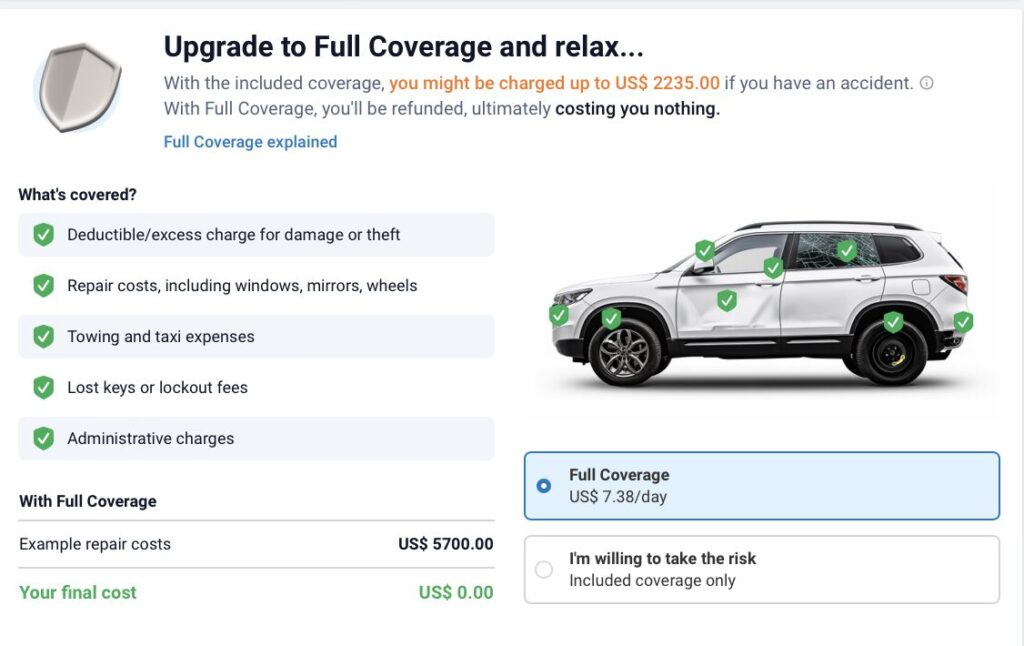
7. Fuel Type: Diesel, Gas, or Electric?
Diesel cars are commonly available and can be more fuel-efficient for long drives. Gas cars are also common. While they are easily filled at gas stations, they are less fuel-efficient.
Electric vehicles are an eco-friendly option, with many charging stations available in cities. However, if planning longer journeys into rural areas, charging points may be sparse.
8. Additional Fees and Considerations
Check the rental conditions carefully to be sure that you are aware of extra charges, as these can accumulate quickly. Some of the additional fees to consider:
- Additional Drivers: Fees for additional drivers,
- Equipment: GPS systems, child seats.
- Young and Old Driver Fees: Drivers under 25 or over 70 may incur additional fees.
- Cross-border travel: Most car rental conditions will list out fees for taking the car into another country. Be sure that the country you are traveling to is on the list of acceptable cross-border crossings. In the example below, this is 63 EUR; we recently were charged 125 EUR for a non-Portuguese border crossing.
- After-Hours Returns: Returning the car outside of business hours may result in extra charges. We often take an early morning flight back from Portugal. Because most rental car agencies don’t open until 6 or 7 am, we either need to return the car the night before or have to pay an extra fee so that they open early. The last time we paid this in Portugal in 2024, we were charged 30 EUR. This will vary depending on the rental car agency.
- One way rental fees can vary significantly, so it’s best to check options across different rental companies.
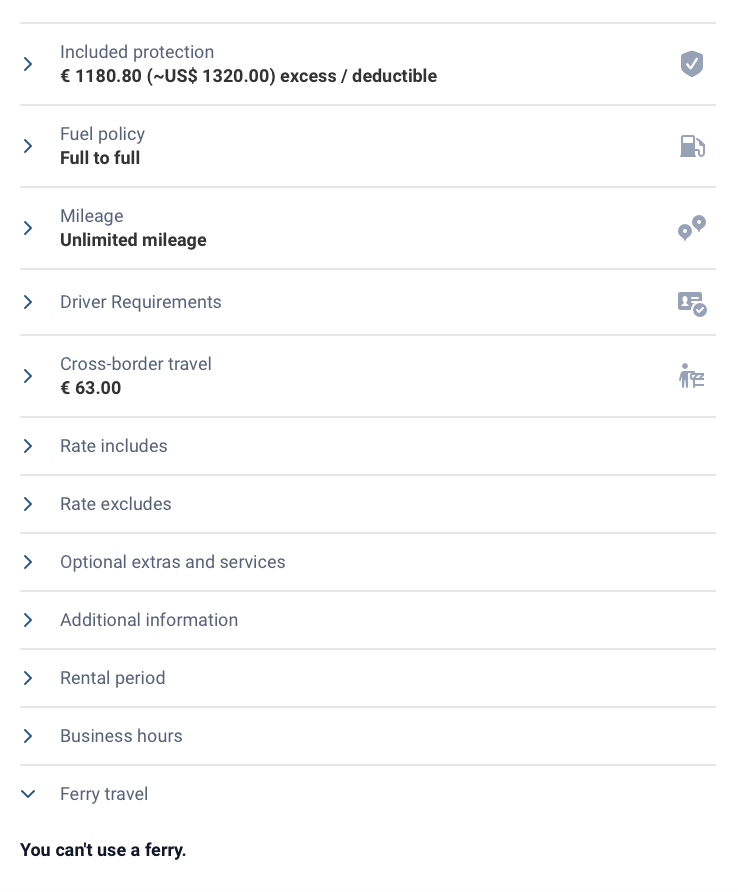
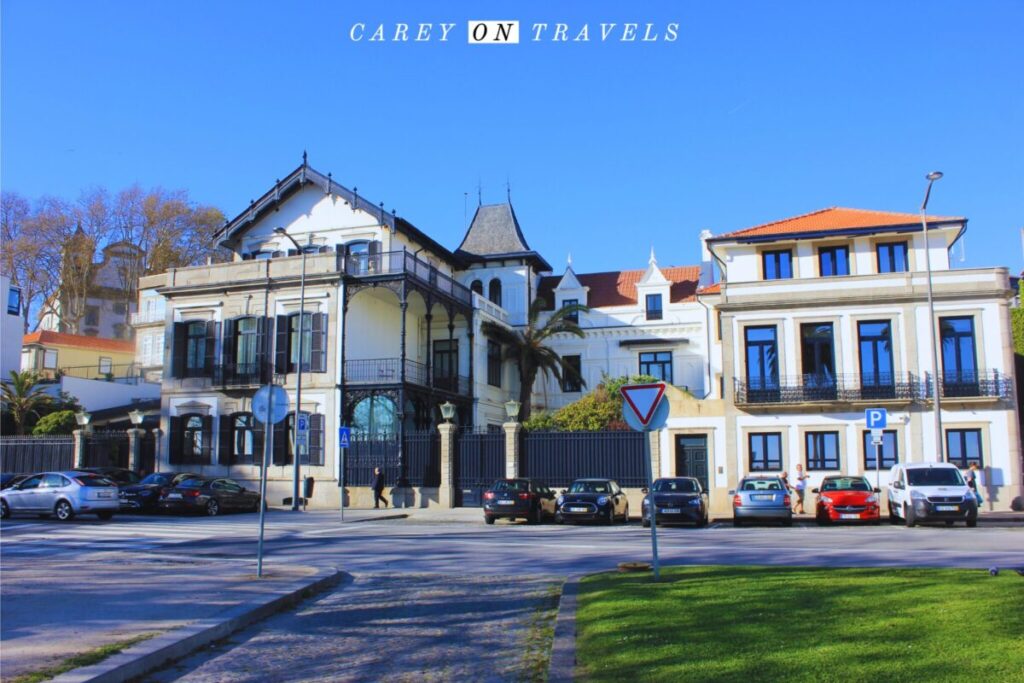
9. Via Verde Passes
Many rental cars come equipped with a Via Verde transponder, or are available for rent. This device allows automatic payment at toll booths and can also be used for some parking facilities, saving time and hassle.
- Discuss the Via Verde transponder at rental car pickup if you’d like to use this feature;
- Tolls: if you have the Via Verde transponder, simply drive through the Via Verde/Green lane. If you opt to not get the transponder, go through the toll lanes and pay with currency or credit cards.
- For parking lots with entry and exit gates, simply select Via Verde when entering and exiting the lot. If you take a ticket on entry, you will typically not be able to pay with Via Verde when exiting).
- For parking lots with entry and exit gates, simply select Via Verde when entering and exiting the lot. If you take a ticket on entry, you will typically not be able to pay with Via Verde when exiting).
- Typically, the rental car company will reconcile your actual Via Verde costs on rental car drop-off.
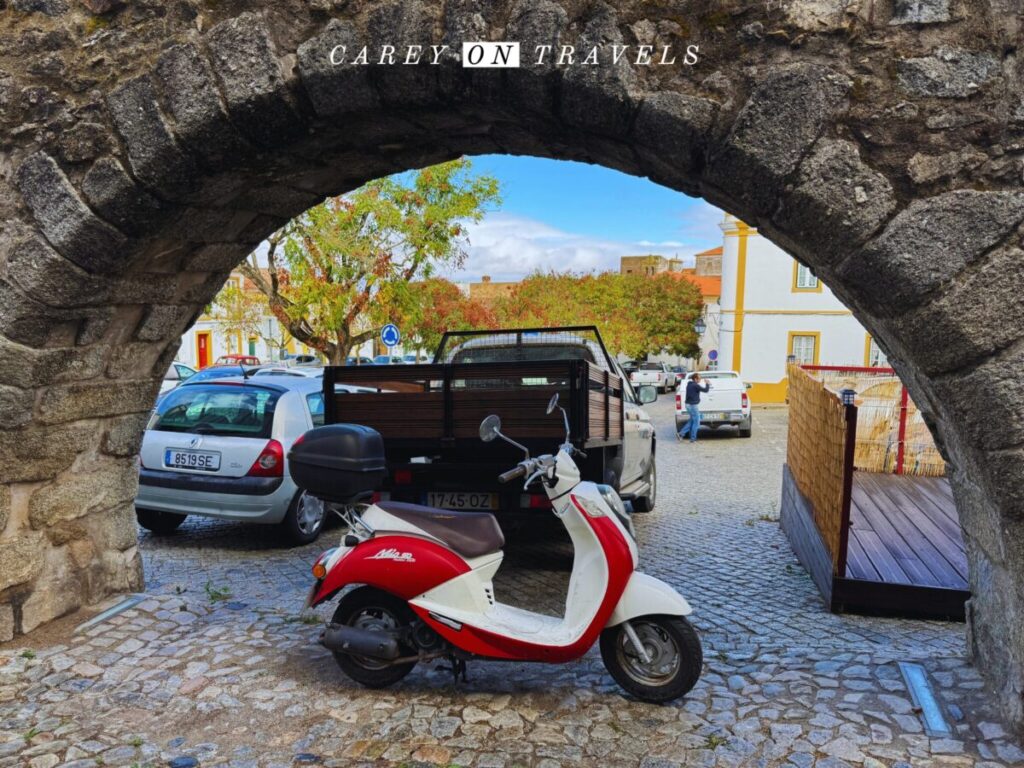
10. Regional Requirements: Snow Chains
In winter, particularly in northern regions like Serra da Estrela, snow chains may be compulsory temporarily, based on conditions. If you will be traveling to the northern, mountainous areas from December to March, check the rental conditions to see whether your rental company provides them.
11. Parking in Portugal
Parking in Portugal can be challenging, especially in major cities. Look for officially marked parking areas and adhere to local parking rules.
- Most urban areas have designated parking zones, indicated by signs or road markings—blue zones usually signify paid parking, while yellow or red lines indicate no parking areas.
- It’s essential to pay for parking using meters or digital parking apps where available, during the controlled hours. In many places, parking is paid during weekdays but free on weekends.
- For street parking: Download the Via Verde Estacionar App, and use this to indicate start and planned end times vs paying at the meter. A few big advantages are that you can pay for a fraction of an hour, and that you can extend the time if you are late getting back to your car.
- In smaller towns and rural areas, parking might be more relaxed, but it’s still crucial to respect signage to avoid fines.
- Many Portuguese cities have started implementing stricter policies in historic centers to preserve the area and reduce congestion, limiting access to non-resident vehicles.
12. Cross-Border Travel and Ferries
Many visitors rent a car in Portugal with plans to drive through both Portugal and Spain. Most car companies charge an extra fee for this. They may also restrict or require additional insurance for driving into other countries. If you plan to cross borders, whether to Spain or beyond, check the car rental conditions carefully to ensure that you are aware of possible fees and any restrictions preventing your travel to those countries.
Additionally, using your rental car on ferries (such as Madeira to Porto Santo) may require prior approval and extra documentation or insurance.
Final Thoughts
Renting a car in Portugal can dramatically enhance your travel experience. It gives you the freedom to explore this diverse country on your own schedule. By understanding and preparing for the rental process, you’ll ensure a smooth and enjoyable journey. Remember, the key to a successful rental experience lies in asking the right questions and reading the fine print. Safe travels!
We use and recommend Discovercars.com, which is a rental car aggregator site. It allows users to easily search pricing and availability across a variety of rental car companies. Search for your rental car on Discovercars.com below:
If you enjoyed this post, pin it for later!

Travel Resources
We recommend booking through our preferred travel booking sites below.
| Air Travel | SkyScanner |
| Lodging | Booking.com, VRBO.com, Expedia.com, Hostelworld |
| Tours and Activities | Viator.com, GetYourGuide.com, TakeWalks.com |
| Car rentals | Discovercars.com |
| Travel insurance | Squaremouth |
| Bike and scooter rentals | BikeBookings.com |
| Train tickets | Trainline, RailEurope |
| Bus tickets | Flixbus, Busbud |

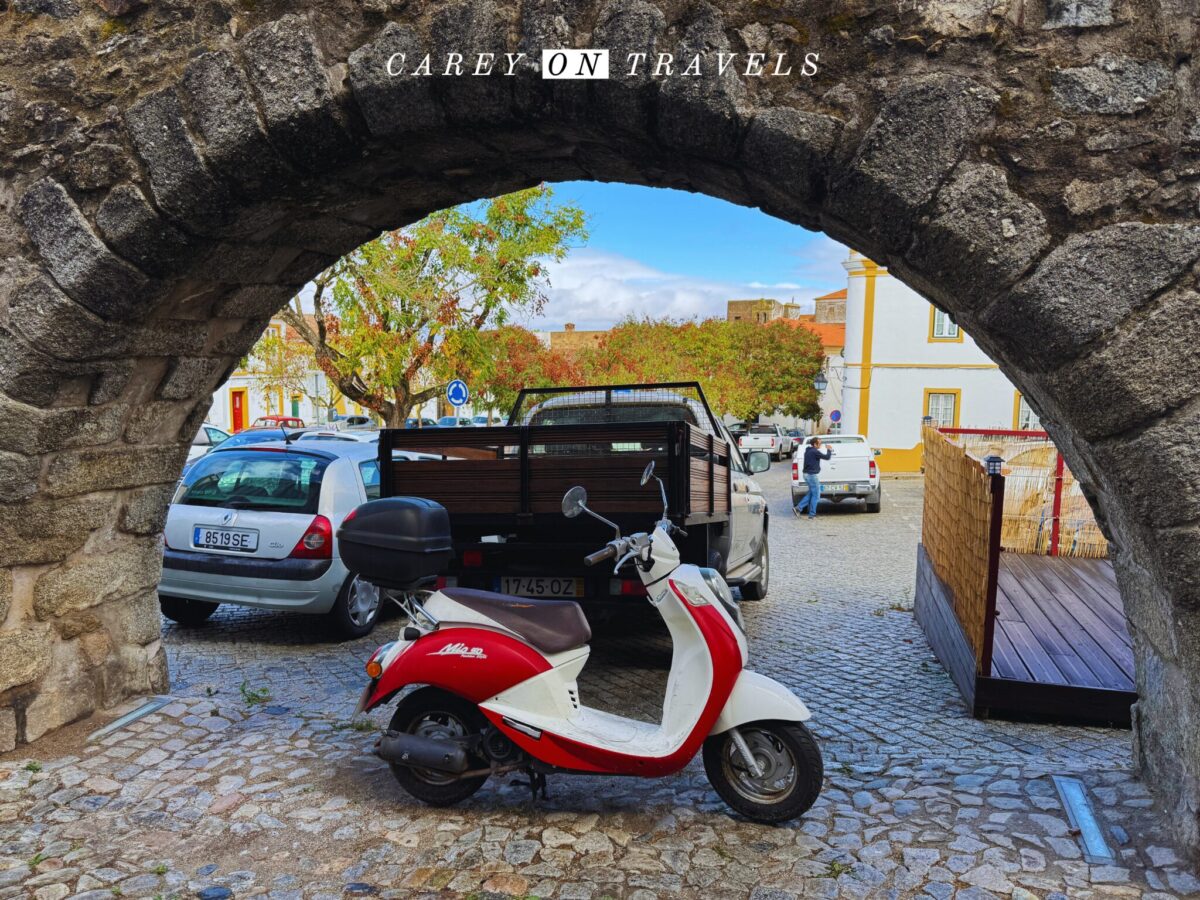

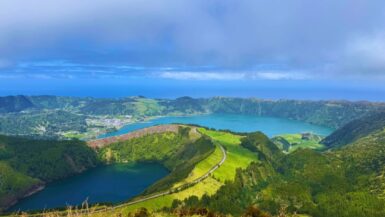

[…] find an option that fits their preferences and budget, which is a clear advantage. If you plan to rent a car in Portugal, you can drive to Sintra in about 30 minutes. Alternatively, you can take a train from […]
Went to Portugal last summer…wish I had seen a guide like this before we went. I can’t believe how tight some of the streets are. As well as the apartment parking is insane. We had an apartment with underground parking and the ramp was super narrow with super tight turns!! I didn’t think we would ever get out of there. We had a BMW 530, but we had 4 people and luggage so not sure we could have gone smaller. Next time we’ll make sure we get a Fiat or something small to alleviate ‘parking anxiety’!
We’ve learned the hard way too. Underground parking garages are often quite small and the parking spaces are very tight. Narrow streets with cars parked on both sides can also be such a challenge.
[…] a car is the easiest approach, though there are public transport options available. Check out our tips on renting a car in Portugal before reserving your car to avoid any unnecessary […]
[…] those renting a car, be sure to read up on tips and tricks for renting a car in Portugal before booking your rental. We use and recommend […]
[…] tranquility. It’s also ideal for those interested in exploring the local vineyards. We recommend renting a car if staying in the countryside, to be able to access the attractions in […]
Portugal is such a beautiful country to drive around. Perfect for a road trip. We drove through the north of Portugal and loved it.
I love how unique each region is as well.
Love your tips on renting a car in Portugal. Yes, a smaller car and a manual is better for hilly crowded places with narrower roads. Thanks for the tip on cross border fee and also the Via verde passes. We are planning a Portugal trip early next year and your tips are going to help us a lot.
Thank you, hope you enjoy your trip!
My driver license expired years ago, so I doubt I’ll ever need to rent a car in Portugal, but I DO love Portugal, so I enjoyed your pix and will check out some other pages!
Thanks!
What a great guide! Renting a car anywhere is so intimidating! This is really helpful.
Thanks for the feedback! It shouldn’t be intimidating, but often is unfortunately.
I’ve never driven in Portugal and I am confident with an automatic car. It’s good to know that these are not as popular as manual transmission ones – I must remember to inform them prior of my preference. You have great tips here – perfect for the first time travellers looking to hire a car.
Thank you for the feedback!
This is a very informative article. Portugal is one of those countries where you need a car to travel to remote places, where public transport is not frequent.
Yes, for those people who are sticking to the big cities, there is no need for a car (and easier without it). But, if you want to get away from these areas, it is much easier with a car.
This is a great guide! You give some great tips here, but I still think I’d need to leave the driving to the locals!
I’ve personally found driving in Portugal to be much easier and less stressful than in Italy or Sicily. That said, I can totally understand your decision.
This is great! Looking back our first experience a few years back was a bit chaotic, this all would’ve been good to know back then.
Thanks!
Very helpful post! However, I would somehow be a little hesitant regarding getting the security deposit after 30 days of dropping-off the vehicle. I mean how would I follow up with the car rental agency if there is an issue regarding the payment.
I can understand your hesitation. There are usually options for no or very minimal security deposits if you are willing to pay more for the car rental. We’ve never had an issue getting a deposit back, but have also been very selective in terms of which company we rent from.
For renting a car in Portugal you have to know all the details to make the right decision. Your article provides lot of useful information to make everything right! Thanks for sharing!
Thanks for the feedback!
We are heading back to Portugal next week and indeed will be renting a car. We are staying at a resort in the middle of nowhere and would not go without having a car. We generally pay for the super insurance coverage so we can just drop a car and go. We have had car repair issues on rental before and we now don’t want to have to deal with any of that. We factor in that extra cost before we decide we want a car. Luckily my Hertz Gold status gets me an extra driver for free.
Hope you have a great trip!
Super informative guide on renting a car in Portugal. Since I don’t rent much, this is the kind of article I seek out when I do need to. I am traveling to Portugal in the near future but due to time constraints sticking to two big cities and will be relying on public transportation within the cities and train between. Excellent guide!
Thanks! It is often easiest without a car if you are sticking to big cities!
[…] By Car: The quickest way to reach Ponte de Lima is by car, taking the A3 motorway towards Valença. This route takes about 50 minutes and allows you to enjoy the beautiful vistas of the Minho region at your own pace. Before reserving your rental car, be sure to check out the top tips for renting a car in Portugal! […]
[…] Driving from Porto to Guimarães via the A3 and A7 motorways is another option, providing flexibility to explore the area at your own pace. The drive takes about 50 minutes. Before reserving your rental car, be sure to check out the top tips for renting a car in Portugal! […]
[…] Driving from Porto to Viana do Castelo by car is easy and typically takes about 50 min – 1 hr 15 min. There is free parking close to the Gil Eannes medicine ship, or you can get paid parking closer in to town. Before reserving your rental car, be sure to check out the top tips for renting a car in Portugal! […]
[…] The drive to Arouca Geopark from Porto takes about an hour and a half. You can rent a car for the day or longer through Discovercars.com. The last section of the drive is on narrow and windy mountain roads. Before reserving your rental car, be sure to check out the top tips for renting a car in Portugal! […]
[…] A taxi ride takes about 8 minutes and costs 10-15 Euros. If you drive, there is easy parking near the fort and near Jardim do Passeio Alegre. Before reserving your rental car, be sure to check out the top tips for renting a car in Portugal! […]
[…] If you prefer to rent a car, be sure to check out the top tips for renting a car in Portugal! […]
[…] The drive takes 15-20 minutes. If you’re driving, you’ll find plenty of parking near the beach. Before reserving your rental car, be sure to check out the top tips for renting a car in Portugal! […]
[…] If you’d like to explore the coast around Azenhas do Mar, traveling by car is the most convenient option. If you need a rental car for the day or for your whole vacation, we use and recommend Discover Cars. Before reserving your rental car, be sure to check out the top tips for renting a car in Portugal! […]
[…] By car, it is about 45 minutes from Lisbon, 30 minutes from Cascais, and 15-20 minutes from Sintra. Parking at Cabo da Roca is free. Before reserving your rental car, be sure to check out the top tips for renting a car in Portugal! […]
[…] If you’re arriving from abroad, Lisbon International Airport (LIS) is the nearest major airport, located approximately 35 kilometers (22 miles) from Cascais. From the airport, you can opt for a hassle-free transfer by taxi or private car, which takes around 30-40 minutes. If you prefer to rent a car, be sure to check out the top tips for renting a car in Portugal! […]
[…] You can opt to drive, which typically takes around 90 minutes via the A8 motorway. This route allows you the flexibility to explore the scenic surroundings at your own pace. You’ll find a number of free parking options when you reach town. We’d suggest parking your car and exploring town on foot or by bike. Before reserving your rental car, be sure to check out the top tips for renting a car in Portugal! […]
[…] The Convent of the Capuchos, nestled in the heart of the Sintra mountains, offers a unique and profoundly humbling experience, distinct from the grandeur typically associated with Sintra’s palaces. This Franciscan convent, founded in the 16th century, is renowned for its remarkable integration with the natural surroundings and its austere architecture. The best way to get to the convent is by car, über, or taxi. Before reserving your rental car, be sure to check out the top tips for renting a car in Portugal! […]
[…] Getting to Cabo da Roca from Lisbon: the fastest way to get to Cabo da Roca from downtown Lisbon is a car or taxi, taking just under half an hour (a taxi will cost roughly 25-30 Euros. The 1624 bus costs under 10 Euros per person takes just under 2 hours. Before reserving your rental car, be sure to check out the top tips for renting a car in Portugal! […]
[…] seconds agoAdd comment Share this article FacebookXRedditPinterestEmail Next article Top Tips for Renting a Car in Portugal Home » Blog » Top Things to Do in the Algarve in […]
[…] Madeira’s diverse regions each offer something special, making it a perfect destination whether you’re looking for adventure, relaxation, or cultural immersion. Choose your base according to what kind of experiences you wish to have and enjoy exploring this enchanting island! For those planning to rent a car while in Portugal, check out these important tips and tricks to ensure a smooth Portuguese car rental experience. […]
[…] days ago21 comments Share this article FacebookXRedditPinterestEmail Previous article Top Tips for Renting a Car in Portugal Next article Where to Stay in Madeira, Portugal Home » Blog » UNESCO » Top Things to […]